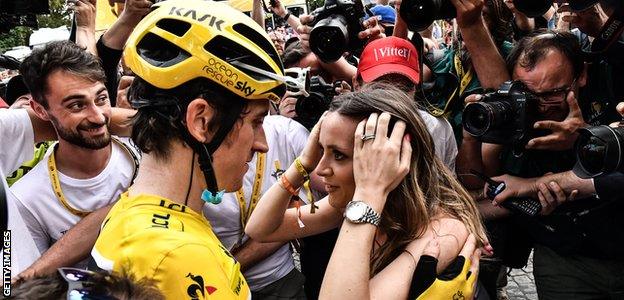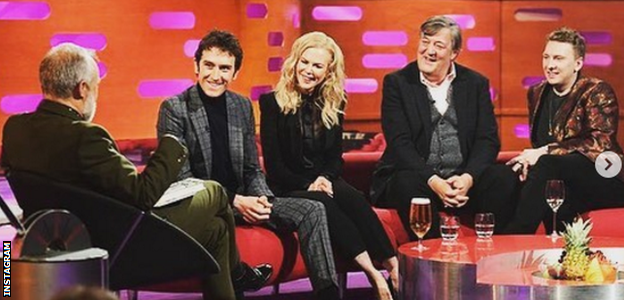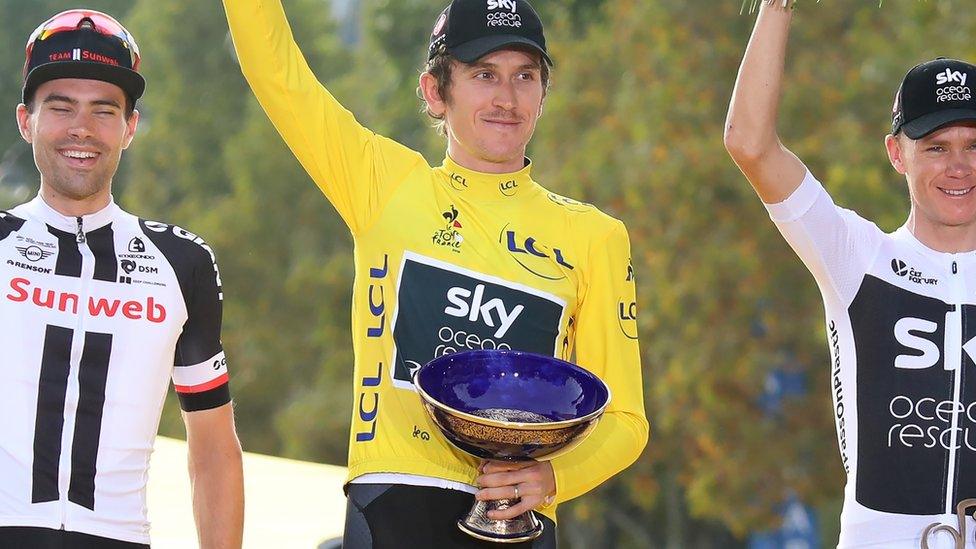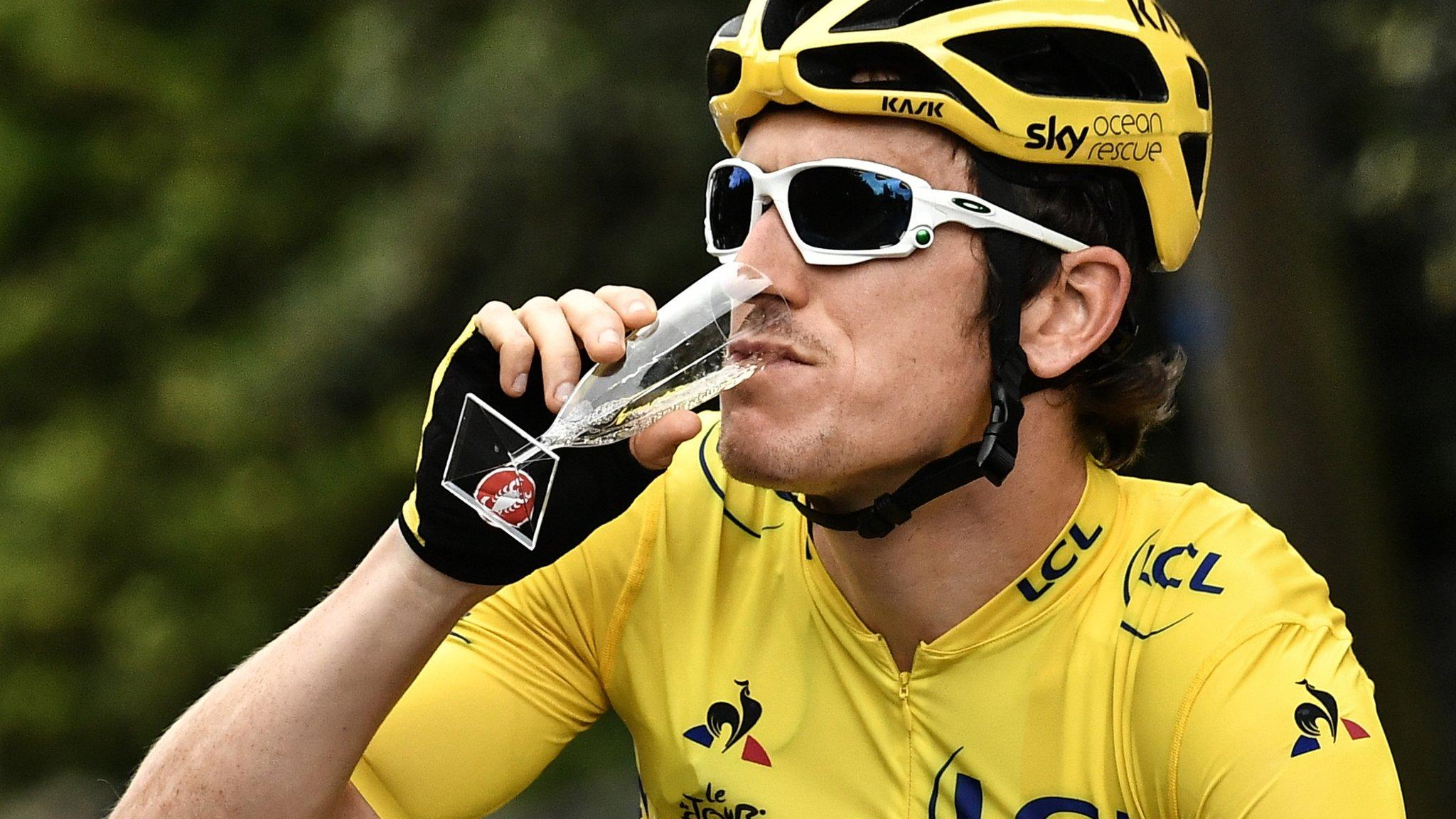Geraint Thomas: BBC Sports Personality winner and wife Sara on Tour de France victory
- Published
Watch: Cyclist Thomas wins Sports Personality of the Year 2018
This was a year when life changed forever for Geraint Thomas, and it did so in giant steps and little ways alike.
Unprecedented leaps like winning the Tour de France and Sports Personality of the Year. Their unpredictable consequences: appearing on the Graham Norton Show alongside Nicole Kidman and Stephen Fry; spending the Spoty after-show party being asked for selfies by sports stars he had always held somewhat in awe.
Few saw it coming. Seven months ago 32-year-old Thomas was being typecast once again as the loyal lieutenant, the unlucky one whose chance had probably passed. But those close to him sensed a difference.
"I saw a change in Geraint in the last week before the Tour," says his wife Sara. "He just went really quiet, and he worried about things.
"On the Tuesday night before the race began, we were still at home in Cardiff. It was so hot that summer, and I woke up at 4am, and he wasn't there.
"I went looking for him. I walked downstairs, and he was asleep on the lounge floor. I asked him what he was doing. 'Yeah yeah, it's just cooler down here, I'll get better sleep.'
"He was on edge. I said to him, I love you, and I love having you around, but you need to go. You're ready."

"Watching him race makes it worse," Thomas' wife Sara says. "You have no control over it whatsoever."
Thomas is usually the most outwardly relaxed of pro riders. He is almost disconcertingly normal, at least until you glimpse the intense competiveness and determination tucked away beneath.
He was tense in those final few days because he knew there was an opportunity in front of him unmatched in his decade of racing the Tour. His three two-week training camps at altitude on Mount Teide on Tenerife had seen him ride better than ever before. He had just won the week-long Criterium du Dauphine, the closest thing there is to a rehearsal for the Tour's cruel Alpine tests. And for the first time he was free to ride for himself, rather than team leader Chris Froome - in the opening week at least.
"Deep down I knew I was in better form than Froomey, because I'd been with him years previously, and I could just tell," he says.
"I was that edge above him, in a really good place, physically and mentally. So when you hear people doubting you, you think, what do I care?"
Thomas' relationship with Sara is central to his success. If he has had to sacrifice himself to the higher ambitions of Froome and Team Sky, so she has had to subsume much of her life into his.
When he crashes out of big races - as he did at the Olympic road race in 2016, at the 2017 Tour having been in yellow, at the Giro d'Italia the same year - she is the one who has to pull him through the doubts and darkness that can follow. When he orders a small portion of steamed fish and spinach in restaurants she has to eat her own normal-sized meal without feeling mortified. And because of what is at stake in the Grand Tours, she can barely bring herself to watch any of the stuff it is all for.
Watch the crash that ended Thomas' Giro hopes
"Watching him race makes it worse," she says. "You have no control over it whatsoever.
"I find it easier to cope with if I do other things - go to work, and then suddenly my phone pings, and I think, it's either going really well or it's going really badly…
"Every night during the Tour when we spoke on the phone Ger would say, oh, wouldn't it be nice if I still had the lead by the same number of seconds as now? And instead it grew after pretty much every mountain stage.
"But I was getting worse. I was pretty good outwardly with him but the longer it went on, the worse I knew it would be if it went wrong. And I never thought it would go wrong because he wasn't good enough; I was thinking, we're going to have a crash at some point…
"That's the weird thing about cycling. You can go from being in the best position of all, in the yellow jersey, a minute ahead, and in a second you can be out of the race.
"That's why it gets worse. It just builds and builds and builds. You're always waiting for something to hit the fan."
One of them suffering at home in Cardiff, taking their cavapoo dog Blanche for long walks to burn through the anxious hours of competition, the other suffering on mountains that make no sense when you grew up in south Wales.
Thomas' greatest test came on the most iconic mountain of them all: Alpe d'Huez, 21 hairpins, 13.8km of climbing at an average gradient of 8%, hundreds of thousands of half-cut spectators lining its steep roads.
'It's just insane really' - Thomas reacts to Tour de France win
Having already raced for 160km, up the Col de la Madeleine and Croix de Fer, he came through the little village of Le Bourg-d'Oisans at the foot of the Alpe in the leader's yellow jersey but with all his big rivals sensing blood, ready to strike: Froome, Dutchman Tom Dumoulin, former champion Vincenzo Nibali, French darling Romain Bardet.
"That day was the most I ever suffered in the Tour. I felt the heat and I felt dehydrated and I started doubting myself in my head.
"It sounds extreme, but if I shot you now, that would hurt. Incredible pain, the threshold of what you could imagine. This was below that, but you have to sustain it for a long time.
"You're climbing and you're thinking, there's still 10 kilometres of this mountain to come. And you're at 95% of your limit.
"You're trying to breathe and you're trying to focus on pedalling and the wheel in front. You forget about everyone else even though there were only five guys left in the group so you knew it had to be hard. You just get wrapped up in your own little world. 'God this is so hard…'
"It's like a team pursuit. When I think back to my first Olympics in 2008, my veteran team-mate Paul Manning used to say, 'Don't go looking for the pain, it'll come. Hold the pace, that's all you have to do. Trust me, it's going to get hard.'
"And that's what I had in the back of my head, going up Alpe d'Huez. It's almost harder riding at 95% than 100%. When you're at 95% you're still thinking about it. 'Hmm, this hurts…'
"You get to 3km to go, and suddenly you think, whoah, I'm racing for the stage here too. And then it almost feels easy, because you're not holding yourself back. It's come on, let's just go."
The moment Thomas knew he had it won came a week later, hundreds of kilometres to the south-west, deep in the Pyrenees, halfway up the Col du Portet - a new climb for the Tour, but an old-fashioned brute: 16km at an average of almost 9%, topping out at 2,215 metres, the highest point of the entire race.
Froome had shocked Thomas by announcing that morning that he intended to attack, even though it risked helping rival riders and teams attack Thomas too.
But when he did, early on the final climb, the four-time Tour champion could not sustain it. A few minutes later, Thomas heard him utter the fateful words over the team radio: 'I'm not feeling super. Slow down a bit.'

Famous friends: "Last night... So surreal being sat on The Graham Norton Show sofa!!"
"Froomey's the best stage racer there is. For him to be suffering - I just thought, that's good, because I'm feeling good, and if he's suffering the other guys must be suffering too.
"That gave me a lot of confidence. I wasn't against him, but it was great for me, and when I rode away from him and Dumoulin in the last few kilometres I knew I still had more to give."
The normal kid from Birchgrove had pulled off something extraordinary. The undemonstrative hardman who had raced 20 days of the 2013 Tour with a broken pelvis was about to reveal another hidden side to his character.
There to greet Thomas as he crossed the finish line on the final Saturday, Tour victory confirmed, was Sara. One of them began to cry uncontrollably. It wasn't Sara.
"I knew he would," she says. "He did at our wedding, for hours, and like the wedding he hadn't thought about it - about the end, about the win, about Paris.
"That's why it hit him like it did. All of a sudden that was it."
It is the one thing, at the end of a remarkable year, that Thomas feels slightly chastened about.
"The television cameraman who was filming me when I was crying, he didn't have to film me for that long, did he? He milked that.
"Even the guy interviewing me asked me two extra questions that he knew I couldn't answer because I was crying. It just overwhelmed me.
"It's not just my wedding and the Tour that's done it, either. The end of Braveheart. And Gladiator. 'Who will help me carry him?' That's what cracked me then.
"Just go to pick him up and have other people help you. Don't ask, 'Who will help me carry him?' Oh man. Why did they have to say that?"
- Attribution
- Published16 December 2018

- Published29 July 2018
